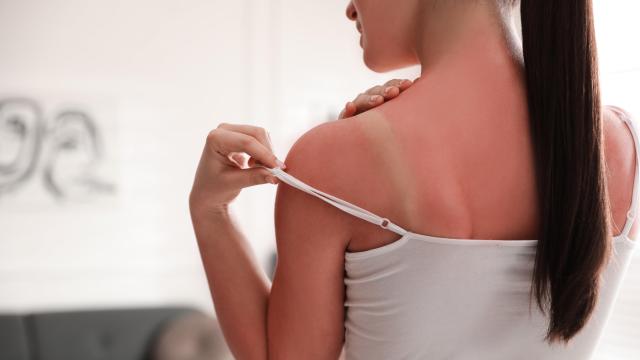Sunburns can be serious, but for the most part, we know how to treat them at home: Use cool compresses, grab some aloe gel, and drink plenty of water. There are times, however, when a sunburn can need medical attention, even if it feels like one of those things you would never consider a trip to the doctor for. Here’s how to recognise whether your sunburn warrants a look by a medical professional.
You have flu-like symptoms
If your sunburn is accompanied by a high fever, a headache, severe pain, dehydration, confusion, nausea, or chills, you should consult your doctor, according to the Mayo Clinic. Per Healthline, these are the symptoms of “sun poisoning,” which is real and can be pretty serious.
Healthline also points out you may be at an increased risk of sun poisoning for a variety of reasons: Maybe you have fair skin, are on antibiotics, take oral contraceptives, use certain herbal supplements (like St. John’s wort), used a citrus oil on your skin before your sun exposure, or live by the equator or up in the mountains. If you just moved to a new region or didn’t know that your oral medication or recent chemical peel could increase your risk, you might end up with sun poisoning before even realising that was a possibility.
You want to be careful of dehydration here. Stay as hydrated as you can — and get to a doctor.
The sunburn is blistering and huge
Dermatologist Dr. Maral Skelsey told Lifehacker that a burn qualifies as severe if there is “extensive blistering over 10% of the body surface area.”
She summed it up like this: “Whenever there is fever, rapid heartbeat, signs of dehydration such as decreased urinary output or poor capillary refill and more than 10% of body surface area affected, seek medical attention.”
Mayo Clinic also says you should also see a doctor if your sunburn is “severe,” has blisters, and covers a large portion of your body. Let’s talk about what “severe” means and why it’s important to identify if your sunburn is.
Per Johns Hopkins, “Severe sunburns may cause a person to become dehydrated and even go into shock. This is characterised by fainting, low blood pressure, and profound weakness. Immediate medical attention is necessary if this happens.”
Johns Hopkins also notes that pain is usually at its worst point by six to 48 hours after the burn takes place, so be alert if your pain lasts longer than that.
You have signs of a skin infection
If you see swelling, pus, or red streaks leading from your blisters, you might have a skin infection and should immediately consult a doctor, according to the Mayo Clinic. You could be prescribed a round of antibiotics. If there is no infection present, you may still be recommended a corticosteroid cream or a short course of prednisone.
Skelsey said that in addition to possibly being prescribed steroids or antibiotics and pain medication, doctors may even suggest specialised wound dressings and daily wound care.
The key here is knowing when a sunburn has escalated from painful nuisance to serious concern. Of course, wear your sunscreen and protective layers any time you’ll be in the sun to avoid this problem ahead of time.

Leave a Reply
You must be logged in to post a comment.